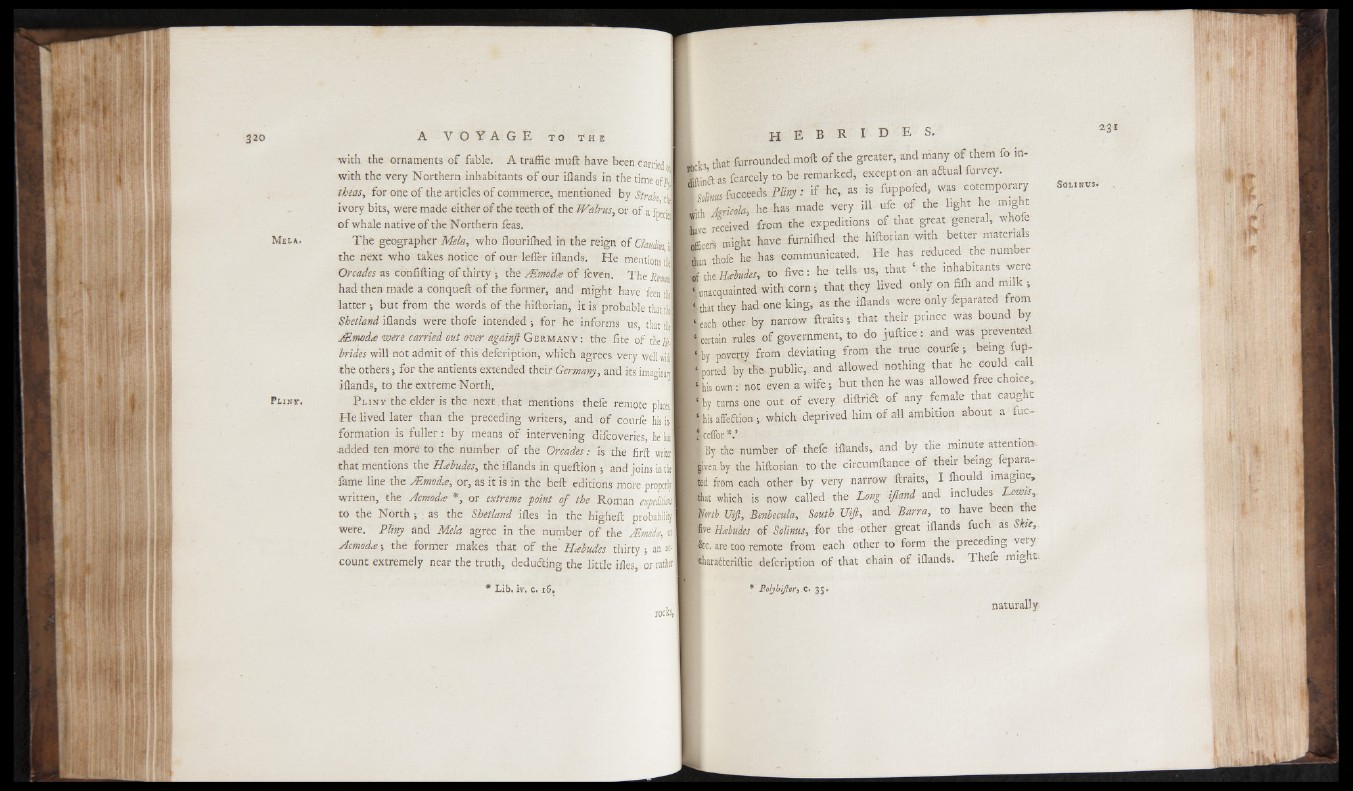
M e l a .
P u n y .
with the ornaments o f fable. A traffic mutt have been carried j
with the very Northern inhabitants o f our iilands in the time off!
theas, for one of the articles of commerce, mentioned by Strabo I
ivory bits, were made either of the teeth o f the Walrus, or of a fpec
o f whale native o f the Northern feas.
The geographer Mela, who flouriihed in the reign of ClauiJ
the next who takes notice of our leffer iilands. He mentions tl
Orcades as confifting of thirty ; the Mmod<e of feven. T h e him
had then made a conqueft of the former, and might have feeii iJ
latter; but from the words of the hiftoriah, it is probable that ill
Shetland iilands were thofe intended ; for he informs us, that tH
JEmodce were carried out over againft G e r m a n y : the fite o f the 15.1
brides will not admit of this defcription, which agrees V e r y well wiil
the others; for the antients extended their Germany, and its im aginrt
iilands, to the extreme North.
P l i n y the elder is the next,that mentions thefe remote pi-ts]
He lived later than the preceding writers, and o f c o u r f e his ijl
formation is fuller: by means o f intervening difcoveries, he k ]
-added ten more to the number of the Orcades: is the firit writ«
that mentions the Habudes, the iilands in queftion ; and joins in tit
fame line the JEmoda, or, as it is in the bell editions more properly]
written, the Acmodbe *, or extreme point of the Roman expidim
to the North; as the Shetland ifles in the higheft probability
were. Pliny and Mela agree in the number o f the Mmoda, or]
Acmoda; the former makes that o f the Habudes thirty; an sol
count extremely near the truth, dedu&ing the little iiles, or rather
* L ib . iv , C. 1 6,
rocks,
L : that furrounded moft of the greater, and many o f them fo in-
a L f t as fcarcely to be remarked, except on an aftual furvey.
i s fucceeds Pliny i if he, as is fuppofed, was cotemporary * » * * ,
t r j S J i>'h» » 'de vev a' “ fc °f liBht T i ;
T . received from the expeditions of that great general, whof
W J miffht have furniihed the hiftorian with better materials
E S S E has communicated. He has reduced the number
■ tht& h J e s, to five: he tells us, that ‘ the ’ "habitants w«e
i unaCquainted with corn; that they lived only on fiih and milk ;
ithat they had one king, as the iilands were only feparated from
leach other by narrow ftraits; that their prince was bound by
■certain rules of government, to do juftice: and was prevented
■by poverty from deviating from the true courfe | being fup-
■ported by the public, and allowed nothing that he could call
I his own: not even a wife; but then he was allowed free choice,,
■by turns one out of every diftrift of any female that caught
P his affeaion ; which deprived him of all ambition about a fuc-
Bceffor
g By the number of thefe iilands, and by the minute attention,
l:|iven by the hiftorian to the circumftance of their being fepara-
from each other by very narrow ftraits, I ffiould imagine,
Bat which is now called the Long ijland and includes Lewis,.
Worth Uift,. Benbecula, South Uijl, and Barra, to have been the
f e HM es of Solinus, for the other great iilands fuch as She,
&c. are too remote from each other to form the preceding very
’tharafteriftic defcription of that chain of iilands. Thefe might.
* Foljbijlor9 Cf 35.
naturally